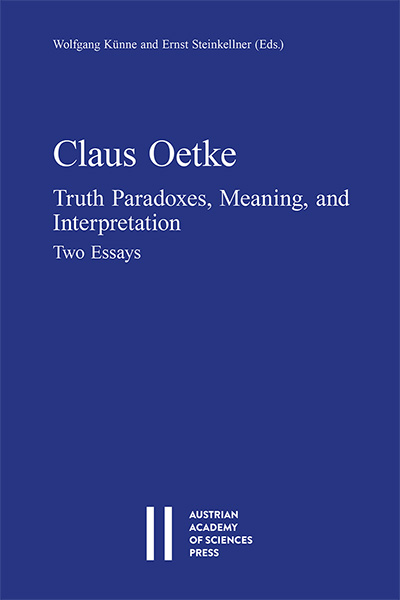
Claus Oetke, pp. 15-108, 2022/02/28
Truth Paradoxes, Meaning, and Interpretation. Two Essays
The aim of this essay is to show 1) that there are various types of truthparadox exhibiting various kinds of prima facie unacceptable consequencesderivable in a prima facie appropriate manner from primafacie indisputable assumptions, 2) that in all those cases the derivationsrely on some shared principle(s) linking meaning to truth withoutwhich the seemingly indefensible results would not follow, 3) thatconsiderations whose plausibility is not exclusively based on the factthat their acknowledgment would eliminate a basis for the derivationof paradoxical consequences support a dismissal, or rather a modification,of the crucial principle(s), 4) that, viewed in this light, truthparadoxes do not provide compelling reasons for rejecting establishedderivation rules of (classical) logic or for discarding commonintuitions about truth and 5) that certain linguistic items can consistentlybe classified as untrue or even false which otherwise are aptto be regarded as falling into a truth-value gap.It emerges as a result that, rather than putting into question ordinaryintuitions about truth, truth paradoxes affect our conceptions aboutwhat linguistic items mean, what they express and what can beasserted by employing them and indirectly even concern the conceptof translation. A major outcome of our investigation lies in thecircumstance that it highlights the significance of raising questionsabout meaning which do not (directly) pertain to linguisticexpressions. They are not represented by questions of the form ‘What does E mean?’, where ‘E’ is a placeholder for a term designating a(meaningful) linguistic item of any category and where ‘mean’ coversall varieties of meaning which linguistic expressions can exhibit. Theyare conveyed rather by questions of the forms ‘What does being Fmean?’, ‘What does it mean (for x) to be F?’, or ‘What does it meanthat x is F?’The present essay is not concerned with the issue whetherparticular formal systems permit one to derive as theorems statementsengendering truth paradoxes or how the derivability of such theoremscan be prevented.4 It rather focuses on the question which consequencescan or should be drawn from the fact that many naturallanguages permit the formulation of sentences which in virtue of theircontent are apt to generate truth paradoxes.